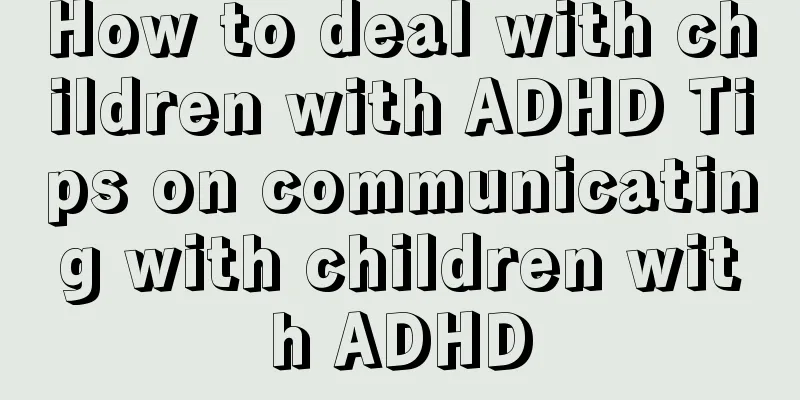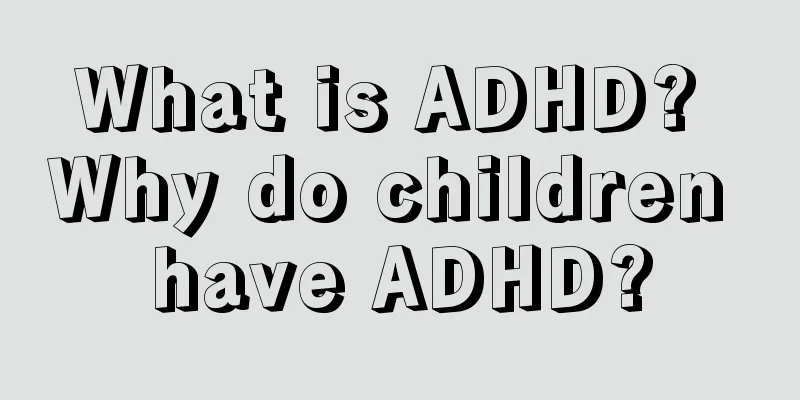How to deal with children with ADHD Tips on communicating with children with ADHD

|
Children with ADHD are always unusually active and naughty. Sometimes parents think their children are very lively, so they do not interfere or adopt the wrong education methods. But like all problem children, they need careful teaching. How to deal with children with ADHD1. First of all, parents should help their children solve the difficulties they encounter in their studies and life. For example, if a child does homework late at night for a long time, which exceeds the child's planned sleep time, it is necessary to communicate with the teacher to temporarily reduce the child's homework; if the child gets into trouble at school, parents should discuss feasible solutions and aftermath methods with the child, rather than simply blaming the child (for example, if the child accidentally hits a classmate, the family should encourage the child to apologize and negotiate with the child to use the child's pocket money to go with the family to visit the classmate). 2. Secondly, parents need to change their irrational beliefs. For example, some parents say that their requirements are not high and that they just need to maintain average grades. 3. Change the way of communication and discuss with children. Parents should learn to communicate with children effectively, learn to listen, understand their children’s thoughts and feelings, and encourage children to express their emotions and feelings in words. 4. Create a relaxed, positive and good family atmosphere for children. Implement the principles of positive discipline in the process of managing children, affirm children's strengths and shining points, and accept their shortcomings. 5. Parents should set an example for their children and lead by example, instead of simply making demands on their children. For example, if a child is addicted to mobile phones and games, both parents and children should reduce the frequency of using mobile phones. 6. Timely intervention and active cooperation in treatment. The harm of ADHD is obvious, including causing inattention and learning difficulties, hindering personality development, and causing social disorders. If not treated in time, it may accompany children throughout their lives. Tips for Communicating Information to Children with ADHD01. Make your expectations clear Don't assume your child understands what "calm" or "try hard" means. Instead, clearly state your expectations so you and your child are on the same page. For example, instead of saying "respect," explain to your child what respect looks like in the actual act of talking to others. 02. Express your negative opinions correctly Don’t tell your child what not to do, tell your child what you want him to do. Instead of saying “Don’t touch that”, say “Keep your hands to yourself”. Instead of saying “Stop interrupting”, say “Be patient”. Focus on the behavior you want, not the behavior you don’t want. 03. Make a positive point Letting your child know beforehand what your expectations are in a particular situation can go a long way toward avoiding meltdowns. If you’re going to the supermarket, give your child the details: “We’ll only buy the things on the list”; “I need you to walk beside me, but you can push the cart”; “You can pick out the cereal you want”, etc. Prepare this before you leave the house, and then again when you arrive at your destination, and have your child repeat the instructions to make sure they are clear. 04. Get your child's feedback and create a plan If you notice that your child is struggling, not following, or having a hard time getting started, ask them what's making it hard for them to do what they want to do. Do they not know how to start? Are they bored or distracted? Maybe they are confused or forget the instructions. When you have a better idea of what's holding them back, work with them to create a plan or strategy for moving forward. Maybe your child needs a snack and a break before starting homework, or doesn't know how to clean their room and needs your help breaking the task down into smaller steps. Taking a more collaborative approach will help you better understand how and why your child is struggling, and what you can do to provide appropriate support. Always keep in mind that learning any kind of new task or skill takes time, patience, and practice. You may also need to spend time approaching these challenges in different ways, and remember to give yourself some grace on your way. Children with ADHD tend to be 3 to 5 years behind their peers in their executive function skills, so they may not be able to act independently at first. Meet your child where they are, adjust expectations accordingly, and continue to practice these skills even if they don’t seem to pick up on them right away. But every little bit of practice paves the way for success later on! Is there a reason why children are hyperactive and impulsive?Normal children may become "naughty" and uncontrollable due to the environment or emotions. For example, they may have a lot of fun in the amusement park or have a quarrel with other children. This is because the prefrontal cortex of children is not fully developed, and they cannot control their emotions and behaviors as well as adults (in fact, we adults cannot control them well in many cases). As long as they are out of this environment and emotions, they will slowly calm down. However, children with ADHD are not self-controlled. Most of their hyperactivity and impulsivity are unconscious and without reason. They will be uncontrollable in any environment. How to improve emotional problems in children with ADHDBeing easily angered, withdrawn, unable to calm down... these are all manifestations of ADHD. When children have this condition, they often expose their potential emotional problems. If this symptom is not discovered early and the child is guided to control his emotions, it will affect the child's physical and mental health in the future. Children with ADHD have poor concentration and poor ability to participate in events, which is closely related to the specific external environment, especially the family environment. For parents, standing in the child's perspective to listen to their troubles, imagine and perceive their moods, is the key to parent-child communication. To this end, parents need to guide their children to calmly express their true thoughts, which will help them sort out their personal emotions. On the basis of children's accurate expression of emotions, parents should understand their needs, and accordingly adopt reasonable methods to help children regulate their emotions and guide them to become optimistic and positive people. Children have their own emotional world. Parents should not influence their children with likes and dislikes. When encountering problems, they should think more about whether their own education methods are appropriate, instead of blindly blaming their children. Parents who know how to respect and understand their children are more likely to win trust, rather than being feared. |
<<: How to deal with children with ADHD Tips on communicating with children with ADHD
>>: Will baby thrush heal on its own? Misconceptions about treating baby thrush
Recommend
What should I do if my baby has yellow hair? What is the reason for my baby's yellow hair?
The baby's hair is sparse, soft and yellow. M...
Should newborns use pillows when sleeping?
Mothers are very happy when they see their newbor...
Can babies get rabies vaccine? Can babies get rabies vaccine?
Can babies get rabies vaccines? There are many fa...
What are the white spots in the newborn's mouth?
Recently, some mothers reported that their babies...
What are the high-tech toys? 20 of the coolest high-tech toys
When parents choose toys for their children, they...
How can we reduce the incidence of baby spitting up? What should we pay attention to after the baby spit up?
The baby's stomach is very fragile. Once ther...
What material is good for a mommy bag? 4 common materials comparison
First, canvas is economical and practical, but it...
Can children eat snake fruit? Can children eat snake fruit?
Snake apple is an imported apple with rich color,...
What factors will affect a baby's walking? When is the peak period of a baby's intellectual development?
Some babies walk a little earlier, while others w...
What should I do if my baby is breathing rapidly?
Does your baby sometimes breathe fast and grunt? ...
How can parents stop their children from making noise in public?
Many parents do not like to take their children t...
Can you eat overnight watermelon? What are the dangers of eating overnight watermelon?
What are the dangers of eating overnight watermel...
What should pregnant women eat to reduce salt intake?
Some pregnant mothers have excessive moisture in ...
Where can I find the shelf life of Pampers diapers? Can Pampers diapers still be used after they expire?
Pampers diapers are really good for babies. They ...
Can I eat spicy food during breastfeeding? What effect will eating spicy food during breastfeeding have on the baby?
Breastfeeding mothers are very careful about thei...









